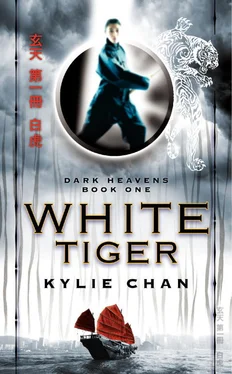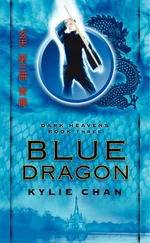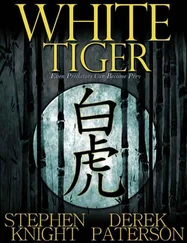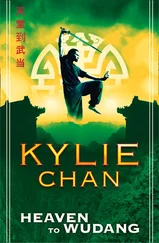Kylie Chan - White Tiger
Здесь есть возможность читать онлайн «Kylie Chan - White Tiger» — ознакомительный отрывок электронной книги совершенно бесплатно, а после прочтения отрывка купить полную версию. В некоторых случаях можно слушать аудио, скачать через торрент в формате fb2 и присутствует краткое содержание. Город: Sydney, Год выпуска: 2010, ISBN: 2010, Издательство: Voyager, Жанр: sf_fantasy_city, на английском языке. Описание произведения, (предисловие) а так же отзывы посетителей доступны на портале библиотеки ЛибКат.
- Название:White Tiger
- Автор:
- Издательство:Voyager
- Жанр:
- Год:2010
- Город:Sydney
- ISBN:978-0-7322-8296-7
- Рейтинг книги:4 / 5. Голосов: 1
-
Избранное:Добавить в избранное
- Отзывы:
-
Ваша оценка:
- 80
- 1
- 2
- 3
- 4
- 5
White Tiger: краткое содержание, описание и аннотация
Предлагаем к чтению аннотацию, описание, краткое содержание или предисловие (зависит от того, что написал сам автор книги «White Tiger»). Если вы не нашли необходимую информацию о книге — напишите в комментариях, мы постараемся отыскать её.
White Tiger — читать онлайн ознакомительный отрывок
Ниже представлен текст книги, разбитый по страницам. Система сохранения места последней прочитанной страницы, позволяет с удобством читать онлайн бесплатно книгу «White Tiger», без необходимости каждый раз заново искать на чём Вы остановились. Поставьте закладку, и сможете в любой момент перейти на страницу, на которой закончили чтение.
Интервал:
Закладка:
Both Taoist and Buddhist deities exist side by side in Chinese mythology; in the legend of the Monkey King ( Journey to the West ), the Monkey creates havoc in Heaven and the Celestial Taoist Bureaucracy is unable to stop him. The Buddha himself intervenes and subdues the Monkey, giving him the task of travelling to India to collect Buddhist scriptures to return to the people of China.
All of the spirits of those who are Immortal—be they Buddhist icons who have achieved enlightenment, spirits who represent forces of nature, or historical figures who are regarded as having attained Immortality—are collectively called Shen. All Shen are believed to exist on a higher plane, but are able to come to Earth either through incarnation as an ordinary person or by taking the form of an ordinary person. The world is therefore believed by many to be full of Shen who live among us as humans.
The ideas of life after death and reincarnation are seamlessly joined together into the concept of Hell. After someone dies, their soul is judged and if it is found to be Worthy, it is escorted directly to the lowest level of Hell and released to Heaven to join the ranks of the Immortals. Those who are not Worthy are judged by the ten ranks of Courts in Hell. If found guilty, they are punished by demons for each set of crimes they have committed during their lifetime. When they have completed their punishment they are given a Soup of Forgetfulness and released back into the world to be reincarnated. Thus existence is an endless series of births, deaths and punishments, which continues until one is judged Worthy of Immortality.
The Four Winds (the White Tiger, Black Turtle, Red Phoenix and Blue Dragon) are slightly different from the Raised Immortals. They are more like signs of the zodiac than actual gods. They represent the four points of the compass and four of the five elements or essences of the universe: the Tiger is Metal; the Phoenix is Fire; the Dragon is Wood; and the Turtle is Water. The fifth essence of Stone or Earth is the Centre and represented by the Jade Emperor himself. The five essences are used throughout the practice of fung shui to provide symbolic references to both the compass points and the relevant essences; for example, turtle figurines will be placed on the northern side of a house to increase its water influence.
Xuan Wu himself is a fascinating and paradoxical god. He developed from the Black Turtle of the North, which sometime in its history was combined with a snake to become a combined serpent/turtle icon. The ancient Chinese believed that male turtles had no sex organs and that female turtles mated with snakes to produce eggs. Xuan Wu symbolises this union. Calling a man a ‘turtle’ also refers to this legend; it’s calling him a cuckold whose wife is finding her satisfaction elsewhere. Chinese place a great deal of importance on family history and ancestry, so the idea that a female turtle mates with multiple males to produce clutches of eggs with mixed parentage is abhorrent. To call someone a ‘turtle egg’ is to call their parentage into question and is a very powerful insult.
Xuan Wu has changed over the centuries to become a human deity as well as the symbolic representation of the North; he has become the Dark Emperor Zhen Wu, the symbol of ultimate martial arts, the quintessential warrior. He was taken by the Ming Dynasty emperors as a patron and the Wudangshan Mountain complex was built in his honour. He is worshipped for his connection with water (thus the temple on Cheung Chau Island for Pak Tai) as well as his connection with martial arts.
One of the Chinese classics, Journey to the North, is the story of Xuan Wu and how he overcame two demons, a snake and a turtle, and through many incarnations in pursuit of the Tao attained Immortality. In another classic, the Creation of the Gods, he is incarnated as a great human general, and at the end of the battle is rewarded for his valour by being granted Immortality and the title of Celestial General.
The Chinese gods are more than static deities with fixed features. They are constantly evolving as stories are woven about them; they are considered to be alive and present in everyday affairs, involved in the running of the Universe and intervening whenever necessary. I hope that my novels will remain true to the storytelling tradition of this mythology, because I have nothing but the greatest respect for this wealth of wonderful beliefs, myths and legends.
Kylie Chan, Brisbane, 2006Suggested Further Reading
Before I list some of the many sources that I waded through trying to find further information about the gods I used in my story, I should acknowledge one particularly useful resource that provided a great deal of my inspiration. It is a book called Chinese Gods, the Unseen World of Spirits and Demons by Keith Stevens. This huge glossy coffee-table type book is a meticulous cataloguing of the many gods the author encountered during his explorations through the temples of China and South East Asia. Although Chinese Gods is no longer in print, a more compact version called Chinese Mythological Gods by the same author is currently available from Oxford University Press and is listed in the suggested readings below.
Another source that merits particular mention is the Washington State University website on Chinese History and Philosophy:
These brilliant, tautly written and deeply researched pages are a treasure-trove for those interested in either the history of China or the different religions practised in this part of Asia.
Following is a (not exhaustive) list of some of the resources I referred to when creating this story.
A Chinese-English Dictionary, Beijing Foreign Language Institute, Beijing 1986.
The Art of War, A New Translation, Sun Tzu, (translated by the Denma Translation Group), 5th ed, Shambhala Publications Inc, Boston 2001.
Lillian Too’s Basic Feng Shui, Lillian Too, Konsep Books, Kuala Lumpur, 1997.
The Right Word in Cantonese, Kwan Choi Wah, The Commercial Press, Hong Kong, 1996.
Chinese Gods, the Unseen World of Spirits and Demons, Keith Stevens, Collins & Brown, London, 1997 (out of print).
Chinese Mythological Gods, Keith G Stevens, 2nd ed, Oxford University Press, London, 2001.
Dragon, compiled by Wang Congren, Hai Feng Publishing Co, Hong Kong, 1996.
Discovering Kwan Yin, Sandy Boucher, 4th ed, Beacon Press, Boston, 1999.
Phoenix, compiled by Wang Congren, Hai Feng Publishing Co, Hong Kong, 1996.
White Tiger, compiled by Wang Congren, Hai Feng Publishing Co, Hong Kong, 1996.
Xuan Wu, compiled by Wang Congren, Hai Feng Publishing Co, Hong Kong, 1996.
Daoism, A Short Introduction, James Miller, One World Publications, Oxford, 2003.
Seven Taoist Masters, a Folk Novel of China, (translated by Eva Wong), 11th ed, Shambhala Publications Inc, Boston, 1990.
Tales of the Taoist Immortals, Eva Wong, Shambhala Publications Inc, Boston, 2001.
Tao Teh Ching, Lao Tzu (translated by John C. H. Wu), 8th ed, Shambhala Publications Inc, Boston, 1990.
Taoism, Paul Wildish, Thorsons, London, 2000.
The Shambhala Guide to Taoism, Eva Wong, 5th ed, Shambhala Publications Inc, Boston, 1997.
The Spiritual Teachings of the Tao, Mark Forstater, Hodder & Stoughton, 2001.
The Way of Chuang Tzu, Thomas Merton, New Directions, New York, 1965.
About the Author
Интервал:
Закладка:
Похожие книги на «White Tiger»
Представляем Вашему вниманию похожие книги на «White Tiger» списком для выбора. Мы отобрали схожую по названию и смыслу литературу в надежде предоставить читателям больше вариантов отыскать новые, интересные, ещё непрочитанные произведения.
Обсуждение, отзывы о книге «White Tiger» и просто собственные мнения читателей. Оставьте ваши комментарии, напишите, что Вы думаете о произведении, его смысле или главных героях. Укажите что конкретно понравилось, а что нет, и почему Вы так считаете.












